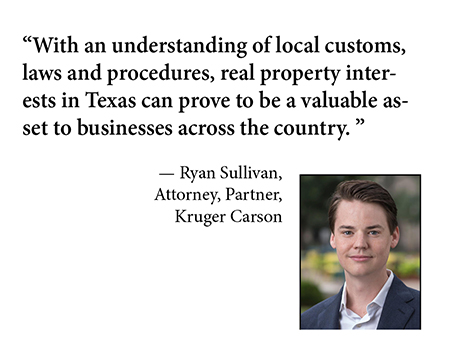By Ryan Sullivan, partner, attorney, Kruger Carson PLLC
Over the last few years, record numbers of businesses have relocated to Texas to take advantage of the strong economy, including a red-hot commercial real estate market.
Whether a party intends to acquire or lease real property, he or she must be aware of several customs and laws that make Texas real estate transactions different from those in other parts of the country. Below is a high-level survey of some of these issues.
Independent Consideration
Purchasers of real property in Texas will want to ensure that their purchase agreements include payments of sums that they cannot recoup even if they terminate during their “free look” period. Otherwise, Texas courts have taken the position that purchase agreements are not enforceable against sellers until some portion of the earnest money has become nonrefundable.
Deceptive Trade Practices
The Deceptive Trade Practice/Consumer Protection Act (DTPA) is intended to protect consumers against unconscionable business practices or unequal bargaining power. The DTPA does not apply to many commercial transactions, but because of the high potential for liability, a carefully drafted waiver should be included in most purchase agreements and leases as a matter of best practice.
Closing Costs
In Texas, title insurance rates are promulgated by the Texas Department of Insurance, such that title companies cannot compete based on pricing.
While the allocation of closing expenses is negotiable between a buyer and a seller, it is customary for the seller to pay the base premium for the buyer’s owner’s policy and the buyer to pay for any additional coverage. There are currently no deed transfer taxes, mortgage taxes or leasehold taxes charged with respect to transactions regarding Texas real property.
Texas Endorsements
In addition to setting rates for title insurance, the Texas Department of Insurance promulgates particular endorsements that are used in Texas. The Texas endorsements are not simply renamed versions of their “ALTA” and “CLTA” counterparts found in other parts of the country. As a result, caution should be used to ensure that a buyer understands what coverage an endorsement actually offers.
Special Warranty Deed
The most common form of deed used for commercial transactions is a special warranty deed. A Texas special warranty deed is instantly recognizable by the prescribed notice that an individual may obscure their social security number or driver’s license number prior to recording.
Notably, Texas law requires carefully drafted language for the grantee to make certain claims with respect to property damage that occurred prior to closing. Additionally, a seller may wish to include “AS-IS” language in the deed, but recent case law indicates that doing so may negate certain covenants and causes of action that were traditionally implied in most deeds.
Mineral Rights
By the time real property is purchased in Texas, the mineral estate is frequently severed from the surface estate. Special care should be taken because it is a matter of settled Texas common law that the mineral estate is considered dominant over the surface estate.
As a result, the owner of the surface estate generally must accommodate certain uses by the owner of the mineral estate. This can have widely varying effects in different parts of Texas (particularly in the age of fracking), depending on such factors as the types of oil, gas and minerals that can be found in the region and any local restrictions on extraction or drilling.
Taxes
While Texas famously does not have a state income tax, property owners pay relatively high ad valorem property taxes. In addition to traditional ad valorem taxes, properties in Texas that are outside municipal boundaries may be part of municipal utility districts or other quasi-governmental authorities that have the authority to impose assessments.
Sellers in such districts are required to make particular disclosures to purchasers or face liability in connection with a sale. Finally, certain entities above a certain revenue threshold will be subject to the “Texas Margin Tax,” which is essentially a franchise tax with a maximum rate of 0.7 percent of revenue. Sophisticated landlords and tenants of triple-net leases will negotiate whether tenants must pay a portion of such taxes.
Finally, Texas buyers should be aware that if they purchase real property that is subject to certain tax exemptions, any development or other activity that forfeits tax exemption can trigger tax liability not only moving forward, but also with respect to the prior three years before such buyer took title.
Evictions
Texas is a relatively friendly environment that offers ample remedies for landlords with tenants that are not performing their obligations under a commercial lease. Texas landlords have a statutory right to lock out a commercial tenant that has failed to make timely payments of rent without first going to court in many cases. Additionally, in most instances, landlords can file a forcible detainer action upon only three days’ notice to formally evict a commercial tenant.
Foreclosures
Lenders establish rights to their collateral through several means in Texas, but the most common and important for sophisticated real estate transactions is by means of a deed of trust granted by the borrower.
Deeds of trust permit lenders to pursue not only judicial foreclosures but also nonjudicial foreclosures. In a nonjudicial, or “power of sale,” foreclosure, a lender is entitled to cause the property to be sold as security for its loan without first filing a lawsuit or receiving a judgment of a court.
Much like Texas itself, real estate deals in this state are different than anywhere else in the country. However, with an understanding of local customs, laws and procedures, real property interests in Texas can prove to be a valuable asset to businesses across the country.
— Ryan Sullivan is an attorney and partner at Kruger Carson PLLC in Austin and San Antonio. His commercial real estate experience ranges from acquisitions and dispositions to leasing and finance.


